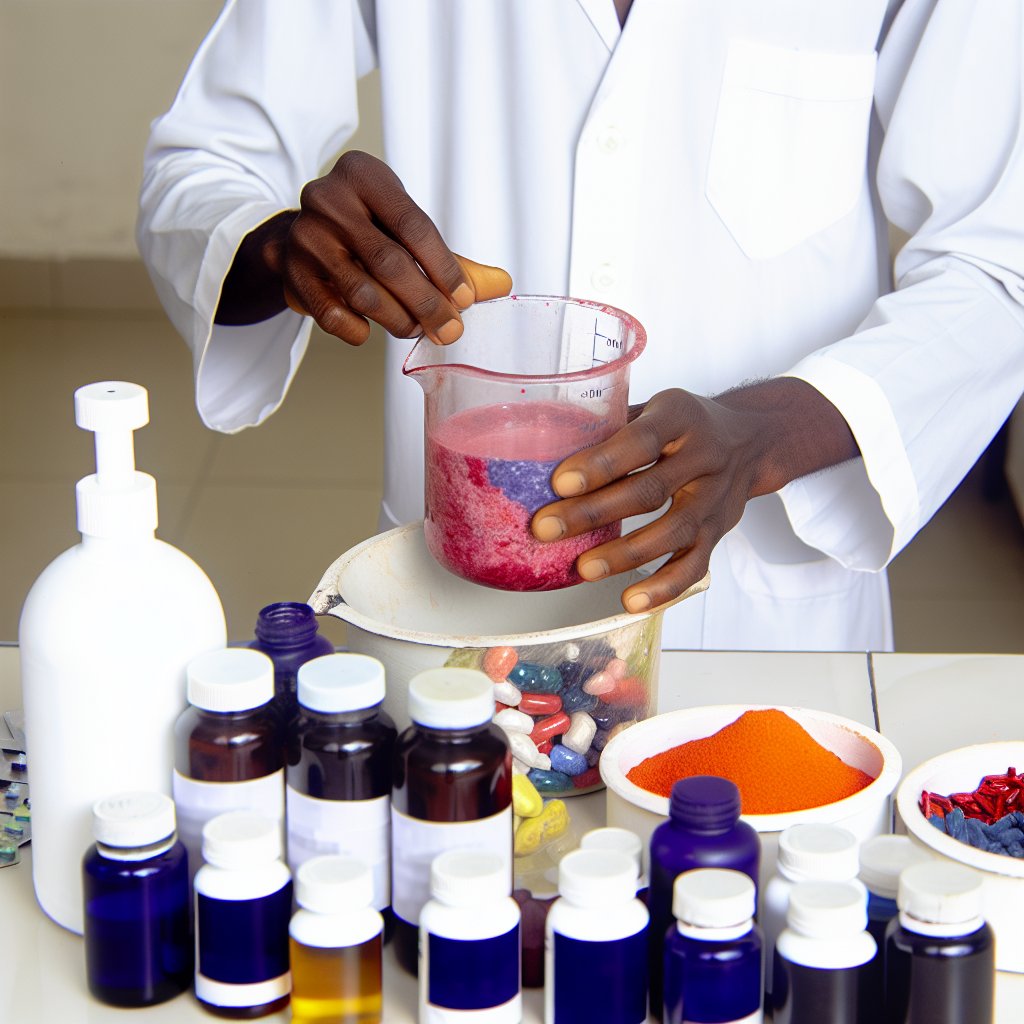Introduction
Zinc plays a crucial role in the human body.
It supports immune function and aids in wound healing.
In Nigerian cuisine, zinc-rich foods like oysters, beef, and beans are commonly found.
Role of Zinc in Immune System Support
Zinc is essential for proper immune system functioning.
It helps fight off infections and illnesses effectively.
Zinc’s Function in Wound Healing
Zinc enhances wound healing by supporting new skin cell production.
It also supports collagen formation, which is vital for skin repair.
Consequences of Zinc Deficiency
A deficiency in zinc can weaken the immune system.
It may cause delayed wound healing and increase infection risk.
Common Zinc-Rich Foods in Nigerian Cuisine
Nigerian diets include several zinc-rich foods.
They comprise pumpkin seeds, seafood, poultry, and whole grains.
Using Zinc Supplements to Support Health
Zinc supplementation can be useful when dietary intake is insufficient.
This can help maintain optimal zinc levels in the body.
Benefits of Including Zinc in the Diet
Zinc is a vital mineral that boosts immunity significantly.
It also enhances wound healing and supports overall health.
Unlock the Power of Nigerian Food Minerals
Discover personalized Food Advisory tailored to boost your health or business using expert insights on Nigerian minerals.
Get StartedIncluding zinc-rich foods or using supplements promotes well-being.
Role of Zinc in Boosting Immunity
- Explanation of how zinc helps strengthen the immune system
- Examples of foods rich in zinc that can help boost immunity
- Benefits of maintaining adequate zinc levels for overall health
Explanation of how zinc helps strengthen the immune system
Zinc plays a crucial role in the development and function of immune cells.
It helps regulate the immune response, reduce inflammation, and protect against infections.
Examples of foods rich in zinc that can help boost immunity
- Shellfish such as oysters, crab, and mussels are excellent sources of zinc.
- Red meat like beef and lamb are also high in zinc.
- Legumes such as chickpeas, lentils, and beans provide plant-based zinc.
- Nuts and seeds like pumpkin seeds, cashews, and almonds contain zinc.
- Dairy products including milk, cheese, and yogurt are good sources of zinc.
Benefits of maintaining adequate zinc levels for overall health
- Improved immune function: Zinc helps the body fight off infections and illnesses.
- Faster wound healing: Zinc aids in the production of new cells for wound repair.
- Supports growth and development: Zinc is essential for proper growth in children and teens.
- Enhances sense of taste and smell: Zinc plays a role in maintaining these senses.
- Boosts mood and cognitive function: Zinc is important for brain health and mental well-being.
Maintaining adequate zinc levels through a balanced diet or supplementation can help boost immunity.
It also promotes overall health and enhances wound healing.
Incorporating zinc-rich foods into your daily meals is a simple yet effective way to support your immune system.
This practice improves your well-being significantly.
Zinc plays a crucial role in wound healing.
It enhances tissue repair, promotes cell growth, and reduces inflammation.
One way zinc promotes tissue repair is by stimulating collagen production.
Collagen is a protein essential for wound healing.
Additionally, zinc helps regulate the immune response.
This regulation is vital for fighting off infection and promoting healing.
When a wound occurs, the body requires more zinc to aid in healing.
Captivate Your Audience with Exclusive Nigerian Food Content
Imagine your platform enriched with unique, mineral-rich Nigerian cuisine stories that no one else can offer. Let's create content that resonates deeply and sets you apart.
Get StartedZinc-Rich Foods That Aid in the Wound Healing Process
- Shellfish such as oysters, crab, and lobster are excellent sources of zinc.
- Red meat like beef and lamb is rich in zinc and can help with wound healing.
- Poultry such as chicken and turkey also contain zinc and promote tissue repair.
- Beans and legumes like chickpeas, lentils, and black beans are plant-based sources of zinc.
- Nuts and seeds like pumpkin seeds, cashews, and almonds provide zinc for wound healing.
- Dairy products such as milk, cheese, and yogurt are good sources of zinc that aid in tissue repair.
- Whole grains like quinoa, oats, and brown rice contain zinc and support the wound healing process.
Adding zinc-rich foods to your diet helps ensure an adequate zinc supply to support wound healing.
It is essential to maintain a balanced diet including zinc-rich foods.
This promotes optimal wound healing and overall health.
Consult with a healthcare provider or registered dietitian to determine your appropriate zinc intake.
Delve into the Subject: Potassium: Regulates Blood Pressure and Fluid Balance
Signs of Zinc Deficiency
In order to understand the importance of zinc in our bodies, it is crucial to recognize the signs of zinc deficiency.
Here are some common symptoms to be aware of.
- Hair loss: Zinc plays a vital role in maintaining healthy hair follicles, so a deficiency can lead to thinning or shedding.
- Slow wound healing: Zinc is essential for proper wound healing, so a deficiency can delay the healing process significantly.
- Weak immunity: Zinc is known for boosting the immune system, so low levels can result in frequent infections and illnesses.
- Loss of appetite: Zinc deficiency can affect your taste and smell senses, leading to a decreased appetite.
- Skin problems: Zinc helps in maintaining healthy skin, so a deficiency can result in acne, eczema, or other skin conditions.
Importance of Detecting and Addressing Zinc Deficiency
Detecting and addressing zinc deficiency is crucial for overall health and well-being.
It is important to understand the impact it can have on our bodies.
- Cognitive function: Zinc is essential for cognitive function and brain health, so a deficiency can lead to cognitive impairments.
- Growth and development: Zinc plays a critical role in growth and development, especially in children, so deficiency can hinder proper growth.
- Hormonal balance: Zinc is involved in the regulation of hormones, so a deficiency can disrupt hormonal balance in the body.
- Digestive health: Zinc is necessary for proper digestion and nutrient absorption, so deficiency can lead to digestive issues.
- Fertility: Zinc is important for reproductive health in both men and women, so deficiency can impact fertility levels.
Ways to Prevent Zinc Deficiency
Preventing zinc deficiency can be achieved through a combination of diet and supplementation.
Here are some ways to ensure you are getting enough zinc.
- Eat zinc-rich foods: Include foods like red meat, poultry, seafood, nuts, seeds, and dairy products in your diet.
- Consider supplementation: If you have trouble meeting your zinc requirements through diet alone, consider taking zinc supplements.
- Be mindful of factors that can affect zinc absorption: Certain factors like phytates in grains and legumes can hinder zinc absorption, so try to minimize their intake.
- Consult with a healthcare provider: If you suspect you may have a zinc deficiency, it is essential to consult with a healthcare provider for proper diagnosis and treatment.
- Monitor your zinc levels: Regular monitoring of your zinc levels can help ensure you are maintaining adequate levels and prevent deficiency.
Uncover the Details: Thallium: Trace Element with Limited Known Benefits
When it comes to boosting immunity, zinc is a powerhouse nutrient.
Zinc also enhances wound healing.
It plays a crucial role in many functions within the body.
Zinc is essential for overall health and well-being.
Why is Zinc Important?
Zinc is an essential mineral involved in over 100 enzymatic reactions in the body.
It supports a healthy immune system.
Zinc promotes wound healing.
It assists in DNA synthesis.
Recommended Daily Intake of Zinc
Ensuring an adequate amount of zinc in your diet supports essential functions.
The recommended daily intake varies by age and gender.
Infants (0-6 months)
- Recommended Daily Intake: 2 mg
- Best Sources: Breast milk or infant formula
- Tips: Ensure your baby is getting enough breast milk or formula
Children (7 months – 3 years)
- Recommended Daily Intake: 3 mg
- Best Sources: Lean meats, dairy, nuts, and whole grains
- Tips: Offer a variety of foods to meet their zinc needs
Children (4-8 years)
- Recommended Daily Intake: 5 mg
- Best Sources: Seafood, poultry, beans and legumes, and fortified cereals
- Tips: Include zinc-rich foods in their meals and snacks
Children (9-13 years)
- Recommended Daily Intake: 8 mg
- Best Sources: Red meat, poultry, seafood, dairy, and nuts
- Tips: Encourage a balanced diet with zinc-rich foods
Teens (14-18 years)
- Recommended Daily Intake: 11 mg for males, 9 mg for females
- Best Sources: Oysters, beef, beans, nuts, and seeds
- Tips: Include zinc-rich snacks like nuts and seeds
Adults (19 years and older)
- Recommended Daily Intake: 11 mg for males, 8 mg for females
- Best Sources: Shellfish, poultry, fortified cereals, and dairy
- Tips: Cook with garlic, onions, and ginger for added zinc
Certain groups such as pregnant and breastfeeding women may require higher zinc amounts.
Consulting with a healthcare provider or registered dietitian helps determine the right zinc amount.
Best Sources of Dietary Zinc
Many foods are rich in zinc.
It is easy to incorporate zinc into your daily meals.
Some of the best dietary zinc sources include:
- Shellfish (oysters, crab, lobster)
- Red meat (beef, lamb, pork)
- Poultry (chicken, turkey)
- Beans and legumes (chickpeas, lentils)
- Nuts and seeds (cashews, pumpkin seeds)
- Dairy (milk, cheese, yogurt)
- Whole grains (oats, quinoa)
- Fortified cereals (bran flakes, oatmeal)
Incorporating a variety of these foods helps meet your daily zinc needs.
It supports your overall health and well-being.
Ways to Include Zinc-Rich Foods in Your Diet
Adding zinc-rich foods to your diet does not have to be complicated.
Here are some simple tips to include zinc in your everyday meals:
- Include a serving of lean meat or seafood in your main meals
- Snack on nuts and seeds for a quick zinc boost
- Add beans or legumes to soups, salads, or stir-fries
- Sprinkle pumpkin seeds on yogurt or oatmeal
- Choose fortified cereals for a zinc-rich breakfast option
- Use dairy like cheese or milk in cooking and baking
A little creativity and planning lets you include zinc-rich foods every day.
This helps you enjoy zinc’s immune-boosting and wound-healing benefits.
The Role of Zinc in Supporting Health and Immunity
Zinc plays a vital role in supporting overall health.
Ensuring adequate daily zinc intake bolsters immunity and enhances wound healing.
Consult a healthcare provider or dietitian for personalized zinc recommendations.
See Related Content: Cobalt: Vital for Vitamin B12 Production

Zinc Supplements and Safety Precautions
Overview of Zinc Supplements and Their Potential Benefits
Zinc supplements are a popular choice for individuals seeking to boost their immune system.
Zinc promotes wound healing and plays a crucial role in many bodily functions.
This essential mineral supports immune function, DNA synthesis, and cell division.
Studies show zinc supplements can reduce the duration and severity of the common cold.
Additionally, zinc supports immune function and aids in wound healing.
Zinc is important for maintaining healthy skin, hair, and nails.
Risks Associated with Excessive Zinc Supplementation
Zinc supplementation offers many health benefits but requires caution against excessive intake.
Too much zinc can cause zinc toxicity with symptoms like nausea and vomiting.
Other symptoms include diarrhea and abdominal pain.
Severe zinc toxicity may lead to copper deficiency and impaired immune function.
Neurological issues can also occur if zinc intake is too high.
Following recommended dosage guidelines is crucial to avoid these risks.
Consulting a healthcare professional before starting zinc supplements ensures safe use.
Importance of Consulting Healthcare Professionals Before Using Zinc Supplements
Before beginning a zinc supplement regimen, consult a healthcare professional.
Doctors or registered dietitians can assess your individual needs effectively.
They recommend the appropriate dosage based on your health goals.
Healthcare professionals also review your medical history and current medications.
Existing health conditions can be evaluated to ensure zinc supplementation is safe.
They provide personalized guidance on how to incorporate zinc supplements into your routine.
Using zinc responsibly under professional advice maximizes benefits and minimizes risks.
Learn More: Cesium: Investigating Its Role in Human Health
Role of Zinc in Immunity and Healing
Zinc plays a crucial role in boosting immunity.
It also enhances wound healing effectively.
Including zinc-rich foods in your diet supports overall health.
Prioritizing zinc intake helps achieve optimal health outcomes.
Additional Resources
13 Foods High in Zinc and Their Health Benefits – Dr. Axe
Dietary Supplements for Immune Function and Infectious Diseases …




